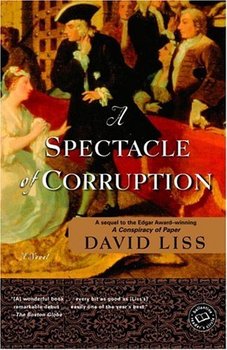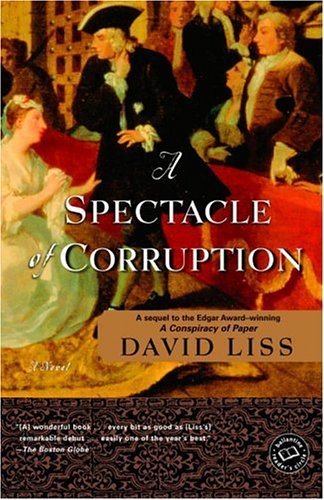
At a time when Americans have grown increasingly concerned about corruption in our political system, it’s useful to review the origins of electoral democracy in England. After all, our own representative democracy honored the same historical roots as the British parliamentary system. And the novelist David Liss opens a window on the sorry state of the political scene across the pond in 1722 in A Spectacle of Corruption. The title specifically refers to the parliamentary election held in that year, shortly after the collapse of the South Sea Bubble triggered a recession in the British economy. “Following the bursting of the Bubble,” Liss’s protagonist writes decades later, “I have never before or since seen such hatred toward the government as volatile as it was in those days.” At the root of this hatred lay rampant political corruption.
A Spectacle of Corruption (Benjamin Weaver #2) by David Liss (2004) 416 pages ★★★★☆
A complex and multilayered story
The story is complex and multilayered, but the narrative thread is essentially simple. It’s couched as a memoir written more than thirty-five years later by a Jewish former prizefighter named Benjamin Weaver, who is falsely accused of murdering a dockworker. Although he proves beyond any reasonable doubt that he is innocent, the judge forces the jury to convict him and promptly sentences him to hang. However, Weaver escapes from prison without delay and sets out to learn who really murdered the dockworker.
Adopting a disguise as a wealthy planter from Jamaica, he soon finds that the murder was in some way connected to the upcoming parliamentary election. And his efforts to exonerate himself threaten to defeat the leading candidate from the highly influential constituency of Westminster. In the process, Weaver finds the newspapers for one party paint him as a notorious villain, while those for an opposing party champion him as a national hero.
Two familiar characters resurface
In this second effort in Liss’s Benjamin Weaver series, we encounter once again two of the principal characters in A Conspiracy of Paper, the first book. Jonathan Wild, a “thieftaker” (who apprehends criminals and delivers them to justice) like Weaver himself, is in reality the country’s first crime boss. “This notorious criminal was still widely believed to be the only true bulwark against the marauding armies of thieves and brigands that plagued the metropolis.” But he plays an unaccustomed role in this sequel. And Weaver’s love interest, his beautiful cousin Miriam, once again plays a prominent role.
An undemocratic system and rampant political corruption
Three centuries ago the British political system bore little resemblance to the prevailing reality in the country today. With a population of perhaps nine or ten million (compared to sixty-seven million today), and voting limited to male property-owners, the total number of voters in Great Britain’s 1722 election was unlikely to have been even one million. There was no secret ballot, ensuring that men in authority could easily dictate how their subordinates would vote. And politicians routinely purchased votes from independent artisans and shopkeepers. This is the political background against which Liss sets his story. He notes, “Once or twice the suggestion of secret voting had been raised in Parliament, but this notion had always been shot down immediately. What did it say of British liberty, the men of the Commons demanded, if a man were afraid to say publicly whom he supports?”
Three contending political forces
Don’t try to wade into A Spectacle of Corruption without at least the rudimentary primer that Liss offers in the Historical Note at the outset of his novel. British politics in the early years of the eighteenth century, Liss explains, was dominated by three contending forces. The Tories “were associated with old money, a strong Church [of England], and a strong monarchy.” The Whigs “were associated with new landless wealth, the stock market, nonconformist Protestantism, divesting power from the Church, and Parliamentary power over royal power.” And the third force, the Jacobites, operated in secrecy to hide their revolutionary intentions. They “believed that the crown should be restored to the deposed James II — and, later, his heirs” in the Stuart dynasty. Jacobites, from Jacobus, Latin for James, “often masqueraded as Tories.” In the early 1700s, they supported James II’s son, James III, known as the Pretender.
In A Spectacle of Corruption, Liss makes the most of this political history, successfully weaving together the suspenseful tale of Benjamin Weaver’s attempt to prove himself innocent with a colorful account of the rampant political corruption in the run-up to the 1722 election. This is a superior example of historical fiction.
For further reading
I’ve also reviewed the first and third books in the Benjamin Weaver series, A Conspiracy of Paper (Financial skullduggery in 18th century England in this historical thriller) and The Devil’s Company (Early industrial espionage in 18th century Britain).
For additional insight into how politics works (or doesn’t), see Top 10 nonfiction books about politics (plus dozens of runners-up).
You might also be interested in:
- Top 10 historical mysteries and thrillers reviewed here (plus 100 others)
- 20 most enlightening historical novels (plus dozens of runners-up)
- Top 10 mystery and thriller series
- Top 10 great popular novels reviewed on this site
And you can always find my most popular reviews, and the most recent ones, plus a guide to this whole site, on the Home Page.



























